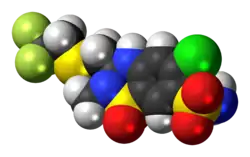Polythiazide
Polythiazide is a thiazide diuretic.[1][2] A diuretic is any substance that promotes the production of urine.
 | |
 | |
| Clinical data | |
|---|---|
| AHFS/Drugs.com | Micromedex Detailed Consumer Information |
| MedlinePlus | a601101 |
| ATC code | |
| Identifiers | |
| |
| CAS Number | |
| PubChem CID | |
| IUPHAR/BPS | |
| ChemSpider | |
| UNII | |
| KEGG | |
| ChEMBL | |
| CompTox Dashboard (EPA) | |
| ECHA InfoCard | 100.005.881 |
| Chemical and physical data | |
| Formula | C11H13ClF3N3O4S3 |
| Molar mass | 439.87 g·mol−1 |
| | |
References
- O'Brien ET, MacKinnon J (October 1972). "Propranolol and polythiazide in treatment of hypertension". British Heart Journal. 34 (10): 1042–4. doi:10.1136/hrt.34.10.1042. PMC 458544. PMID 5086971.
- Monroy A, Plata C, Hebert SC, Gamba G (July 2000). "Characterization of the thiazide-sensitive Na(+)-Cl(-) cotransporter: a new model for ions and diuretics interaction". American Journal of Physiology. Renal Physiology. 279 (1): F161-9. doi:10.1152/ajprenal.2000.279.1.f161. PMID 10894798.
This article is issued from Wikipedia. The text is licensed under Creative Commons - Attribution - Sharealike. Additional terms may apply for the media files.